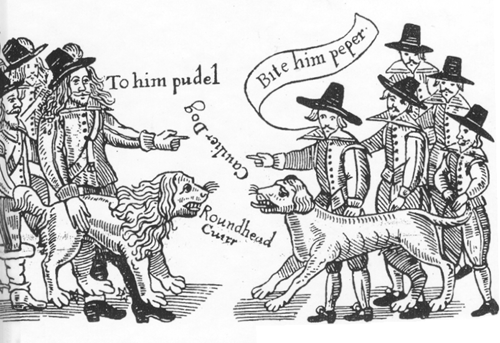A Thorny Problem: Historical Causation

cartoon of Roundheads & Cavaliers (1642)
- What is a historical cause?
- Why are there problems in determining historical causes?
- Why are there ongoing debates about historical episodes?
With these questions in mind, consider excerpts from
The Causes of the English Civil War (1999)
by Norah Carlin.
We have to take seriously the possibility that our knowledge of the outcomemay have distorted our understanding of the origins of the conflict, and tryto correct this.
[However] much we recover by the hard work of researchers into the past, we will never know 'all the facts' about the situation that led to the English civil war.
Even if we did know all the facts (and it is hard to know where we would draw the line), their meaning and relevance would still be matters for debate. Most historical situations are too complex for causes to be identified by using any set of scientific laws or logical rules, or indeed by the application of any theory which would predict the relation between causes and specific effects. . .
to search for a single, sufficient cause which would make all other explanations unnecessary is to pursue an illusion. . .
It has been argued that all judgments in history are subjective, depending on nothing more that the individual historian's prejudices or position in relation to the historical establishment. In so far as this is saying that the study of history is not an isolated intellectual pursuit, but is itself part of the history of society and is constructed by those who practice it, it has a great deal of validity. But the inadequacy of rejecting a historical judgment because of its ideological implications or because of the position of the person advocating it can be shown. . .
It is this search for better explanations, rather than the unattainable 'correct' explanation, that spurs historiansto uncover more evidence, more documents which do or do not fit a particular explanation, and to engage in more discussions about the meaning of the past and the present. . .
Certainty can never be achieved in debates about historical causation, but this is not a problem, so long as we are continuallytrying to improve and refine our historical studies, along with our understanding of human affairs in general.
The alternatives seem to be either total scepticism, which would give up on any attempt to understand why wars and revolutions, for example, have happened; or total relativism, which would recognize many different explanations but would forbid their supporters to argue about whether some are better than others.
When we are dealing with ideas, there should be a rigorous obligation on historians to locate concepts in their contemporary context, because it is important not to attribute to people of the past thoughts which they could not have had.
historians of the English civil war frequently seem to have been attracted by the prospect of cutting through all the problems and reducing the solution to a single cause which would make allprevious answers obsolete. This has been most tempting to those who believe in short-term causesonly, and are dazzled by the concept of one accidental, avoidable event or coincidence whos absencecould have prevented the civil war and altered the whole course of English history . . .

